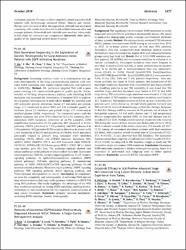Crizotinib efficacy in alk-positive advanced stage non-small cell lung cancer patients: A real-world experience from Turkey

Göster/
Erişim
info:eu-repo/semantics/openAccessTarih
2018Yazar
Kılıçkap, SadettinÖztürk, Akın
Karadurmuş, Nuri
Korkmaz, Taner
Yumuk, Perran Fulden
Çiçin, İrfan
Paydaş, Semra
Çılbır, Ebru
Sakalar, Teoman
Uysal, Mükremin
Üskent, Necdet
Demir, Nurcan
Sakin, Ayşegül
Turhal, Nazım Serdar
Keskin, Serhat
Tural, Deniz
Eralp, Yeşim
Buğdaycı Başal, Fatma
Yaşar, Hatime Arzu
Sendur, Mehmet Ali Nahit
Demirci, Umut
Çubukçu, Erdem
Karaağaç, Mustafa
Karaca, Saziye
Tatlı, Ali Murat
Yetişyiğit, Tarkan
Urvay, Semiha
Gürsoy, Pınar
Oyan Uluç, Başak
Turna, Zeynep Hande
Küçüköner, Mehmet
Ölmez, Ömer Fatih
Çabuk, Devrim
Şeker, Mesut
Ünal, Olçun Umut
Meydan, Nezih
Okutur, Sadi Kerem
Tunalı, Duygu
Üst veri
Tüm öğe kaydını gösterKünye
Kılıçkap, S., Öztürk, A., Karadurmuş, N., Korkmaz, T., Yumuk, P., Çiçin, İ. ... Tunalı, D. (2018). Crizotinib efficacy in alk-positive advanced stage non-small cell lung cancer patients: A real-world experience from Turkey. Journal of Thoracic Oncology içinde (S477-S478. ss.).Özet
Background: Increasing evidence leads to a ratiocination that genetic heterogeneity of the lung adenocarcinoma patients with sensitive EGFR mutations may impact clinical responses and outcomes to EGFR-TKIs. Method: We performed targeted NGS with a gene panel covering 416 cancer-related genes to profile genetic characteristics of 69 lung adenocarcinoma patients with activating EGFR mutations and assessed the contribution of targeted NGS to exploration of genetic heterogeneity of such cohort. Result: We detected total 200 actionable genetic alterations (mean 2.9 variations per patient, range: 1-7 variations) in tumor DNA and 140 actionable genetic alterations (mean 2.0 variations per patient, range: 0-5 variations) in matched plasma ctDNA, respectively. The concurrent genes with the highest mutation rate were TP53 (observed in 72.5% patients), other uncommon EGFR mutations (observed in 21.7% patients), EGFR amplification (observed in 20.3% patients), RB1 (observed in 10.1% patients), PIK3CA (observed in 7.2% patients), and MYC (observed in 5.8% patients). NGS provides EGFR mutation detection in plasma with a test sensitivity of 88.2% and specificity of 100.0%.
WoS Q Kategorisi
Q1Kaynak
Journal of Thoracic OncologyCilt
13Sayı
10Koleksiyonlar
- Bildiri Koleksiyonu [516]
- WoS İndeksli Yayınlar Koleksiyonu [6631]

















